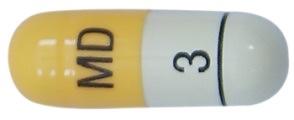Dofetilide
Generic name: dofetilide [ doe-FET-i-lide ]
Brand name: Tikosyn
Dosage form: oral capsule (125 mcg; 250 mcg; 500 mcg)
Drug class: Group III antiarrhythmics
What is dofetilide?
Dofetilide is a heart rhythm medicine, also called an antiarrhythmic.
Dofetilide is used to help keep the heart beating normally in people with certain heart rhythm disorders of the atrium (the upper chambers of the heart that allow blood to flow into the heart). Dofetilide is used in people with atrial fibrillation or atrial flutter.
Dofetilide may also be used for purposes not listed in this medication guide.
Dofetilide side effects
Get emergency medical help if you have any of these signs of an allergic reaction: hives; difficult breathing; swelling of your face, lips, tongue, or throat.
Dofetilide may cause serious side effects. Call your doctor at once if you have:
-
headache with chest pain and severe dizziness, fainting, fast or pounding heartbeats;
-
loss of appetite, vomiting or severe diarrhea; or
-
low magnesium or potassium--confusion, uneven heart rate, increased thirst or urination, sweating, jerking muscle movements, leg discomfort, muscle weakness or limp feeling.
Common side effects of dofetilide may include:
-
mild headache;
-
mild dizziness; or
-
cold symptoms such as stuffy nose, sneezing, sore throat.
This is not a complete list of side effects and others may occur. Call your doctor for medical advice about side effects. You may report side effects to FDA at 1-800-FDA-1088.
Related/similar drugs
Warnings
You should not take dofetilide if you have severe kidney disease or a history of Long QT syndrome.
Serious drug interactions can occur when certain medicines are used together with dofetilide. Tell each of your healthcare providers about all medicines you use now, and any medicine you start or stop using.
You will need to spend at least 3 days in a hospital setting when you first start taking dofetilide. This is so your heart rhythm and kidney function can be monitored in case the medicine causes serious side effects.
Before taking this medicine
You should not take dofetilide if you are allergic to it, or if you have:
-
severe kidney disease (or if you are on dialysis); or
-
a history of Long QT syndrome.
Some medicines can cause unwanted or dangerous effects when used with dofetilide, and should not be used at the same time. Your doctor may need to change your treatment plan if you use any of the following drugs:
-
cimetidine;
-
megestrol;
-
trimethoprim (Proloprim, Trimpex, Bactrim, Septra);
-
verapamil; or
-
a diuretic (water pill) that contains hydrochlorothiazide (HCTZ), such as Accuretic, Aldactazide, Atacand HCT, Benicar HCT, Diovan HCT, Dyazide, Exforge HCT, Hyzaar, Lopressor HCT, Maxzide, Micardis HCT, Monopril HCT, Prinzide, Tekturna HCT, Vaseretic, and others.
To make sure dofetilide is safe for you, tell your doctor if you have:
-
liver or kidney disease;
-
depression, mental illness;
-
asthma or allergies;
-
any active infection;
-
skin problems; or
-
an electrolyte imbalance (such as low levels of potassium or magnesium in your blood).
It is not known whether dofetilide will harm an unborn baby. Tell your doctor if you are pregnant or plan to become pregnant while using this medicine.
It is not known whether dofetilide passes into breast milk or if it could harm a nursing baby. You should not breast-feed while you are using dofetilide.
How should I take dofetilide?
Dofetilide is available only from a hospital or specialty pharmacy.
You will need to spend at least 3 days in a hospital setting when you first start taking dofetilide. This is so your heart rhythm and kidney function can be monitored in case the medicine causes serious side effects.
Follow all directions on your prescription label. Do not take this medicine in larger or smaller amounts or for longer than recommended.
You may take dofetilide with or without food.
You should not skip doses or stop using dofetilide suddenly. Stopping suddenly may make your condition worse. Follow your doctor's instructions about tapering your dose.
Tell your doctor if you have a prolonged illness that causes severe diarrhea, vomiting, or heavy sweating. These conditions can cause an electrolyte imbalance, making it dangerous for you to use dofetilide.
Your blood pressure will need to be checked often. Your kidney function may also need to be checked with frequent blood tests.
Store at room temperature away from moisture and heat.
What happens if I miss a dose?
Skip the missed dose and take your next dose at the usual time to stay on schedule. Do not take extra medicine to make up the missed dose.
What happens if I overdose?
Seek emergency medical attention or call the Poison Help line at 1-800-222-1222.
What should I avoid while taking dofetilide?
Grapefruit and grapefruit juice may interact with dofetilide and lead to unwanted side effects. Discuss the use of grapefruit products with your doctor.
What other drugs will affect dofetilide?
Other drugs may interact with dofetilide, including prescription and over-the-counter medicines, vitamins, and herbal products. Tell each of your health care providers about all medicines you use now and any medicine you start or stop using.
More about dofetilide
- Check interactions
- Compare alternatives
- Pricing & coupons
- Reviews (78)
- Drug images
- Side effects
- Dosage information
- During pregnancy
- Drug class: group III antiarrhythmics
- En español
Patient resources
Other brands
Professional resources
Other brands
Related treatment guides
Further information
Remember, keep this and all other medicines out of the reach of children, never share your medicines with others, and use this medication only for the indication prescribed.
Always consult your healthcare provider to ensure the information displayed on this page applies to your personal circumstances.
Copyright 1996-2025 Cerner Multum, Inc. Version: 4.01.

